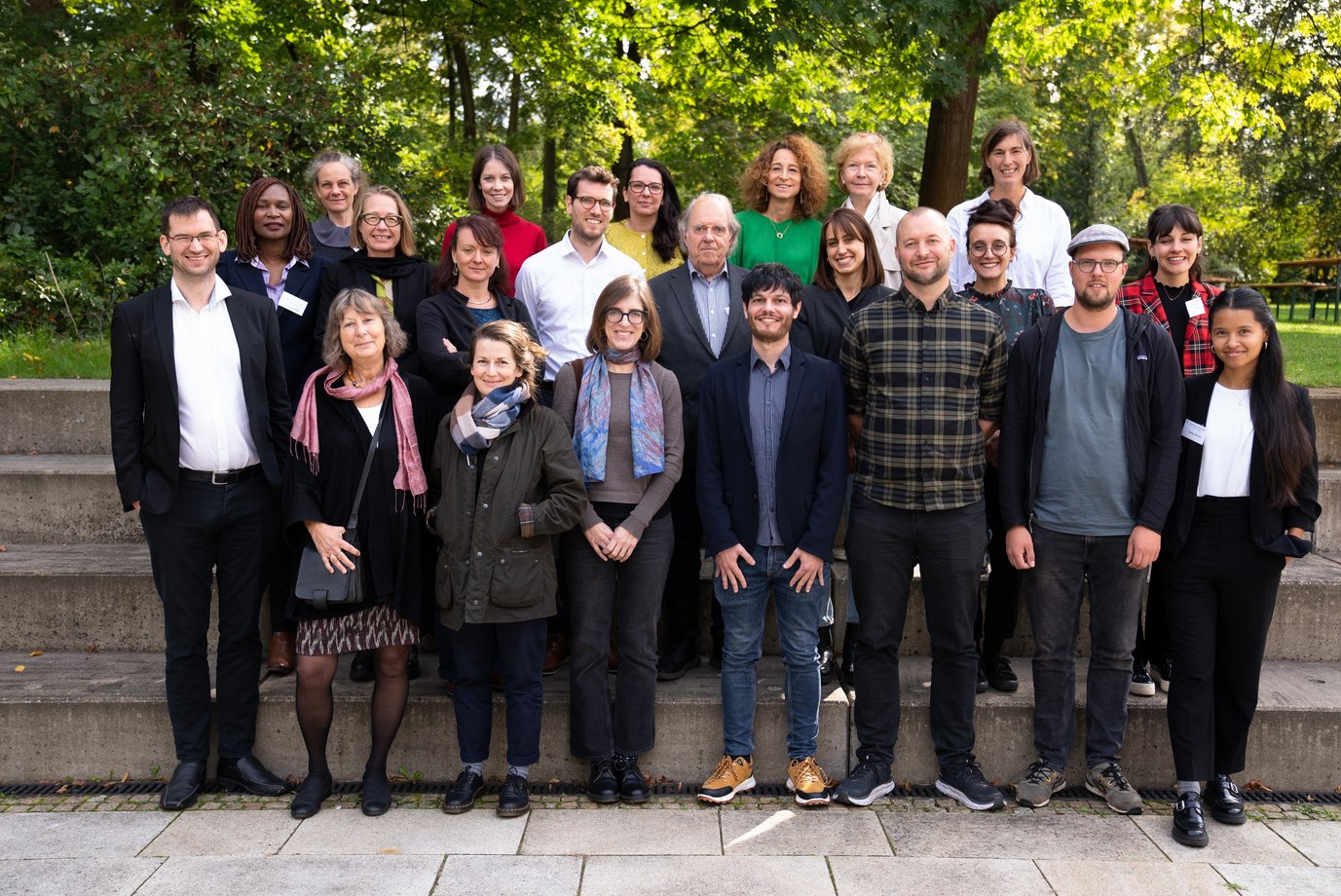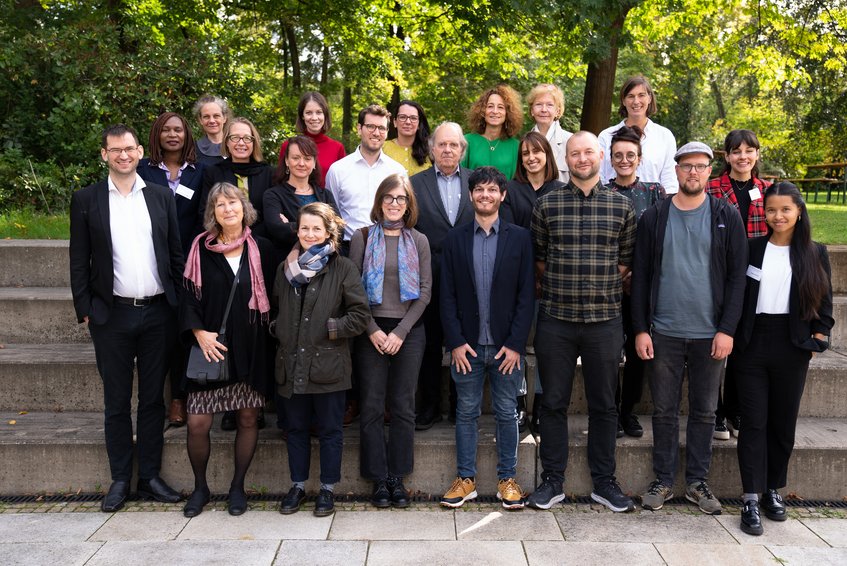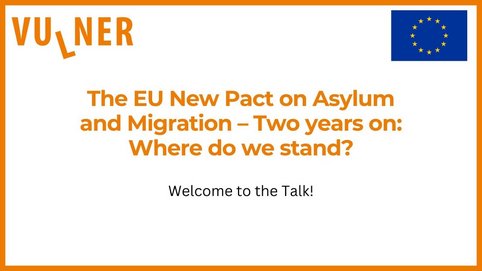VULNER Workshop
On September 22-23, a workshop was organized by Luc Leboeuf, VULNER scientific coordinator, at the Harnack Haus in Berlin. The objective of the workshop was to take stock of the main common research findings, now that the VULNER project enters in its third and final phase.

On September 22-23, a workshop was organized by Luc Leboeuf, VULNER scientific coordinator, at the Harnack Haus in Berlin. The objective of the workshop was to take stock of the main common research findings, now that the VULNER project enters in its third and final phase. In a first phase, data were collected and analyses were made on the multiple legal and bureaucratic meanings and functions that ‘vulnerability’ receives in institutional replies to migrants seeking protection, in each of the countries under study. In a second phase, ethnographic fieldwork was conducted among migrants seeking protection to document their perspectives on their main life challenges, and to analyze them in relation to existing institutional replies aimed at alleviating their vulnerabilities.
During the discussions on the first panel, Sophie Nakueira (Max Planck Institute for Social Anthropology), Maria Maalouf (Centre for Lebanese Studies), and Lewis Turner (Newcastle University), addressed the challenges associated with mobilizing ‘vulnerability’ to better target humanitarian aid programmes towards refugees in Uganda, Lebanon, and Jordan. Erlend Paasche (Institute for Social Research in Norway) and Dagmar Soennecken (York University) analysed how vulnerabilities are assessed as part of resettlement programmes to Norway and Canada respectively. The presentations were discussed by Raffaella Greco Tonegutti, from the Belgian development agency ENABEL.
The presentations and the following discussions highlighted the multiple bureaucratic meanings that ‘vulnerability’ is receiving, depending on the institutional actors in charge. Attempts that have been made at streamlining humanitarian responses towards the most vulnerable through a whole of society approach, for example, by setting-up a common vulnerability assessment framework, were assessed critically. The relationship between ‘vulnerability’ and socio-economic indicators was highlighted and questioned, and the implementation difficulties resulting from funding limitations were emphasized – for example, the involvement of refugee led organizations in identifying the most vulnerable, who need immediate assistance, only feeds corruption if these organizations aren’t given sufficient financial support to conduct their mission.
The presentations also showed how, when assessed as part of resettlement programmes, ‘vulnerability’ interacts with broader policy considerations that relate to future integration prospects, and practicalities such as interview capacities. They highlighted the lack of continuous support, once the person has been resettled, and the need to provide for adequate communication channels on their specific protection needs – especially when the selection process is mainly at the hand of private actors, such as in private sponsorship programmes.
The discussions on the second panel addressed the uses of vulnerability assessments as part of asylum processes in Europe and Canada, and the corresponding challenges. Geert Knockaert and Giorgia Ferrara (European Union Agency for Asylum) introduced the agency’s strategy to identify and address vulnerabilities as part of asylum processes in Europe, by providing adequate support to the asylum seekers with specific needs. Sabrina Marchetti and Letizia Palumbo (Ca’ Foscari University of Venice) focused on the findings from the Italian case study, and showed how a situated approach to vulnerability assessments is required to consider how vulnerabilities result from multiple intersecting factors. Hilde Liden and Jessica Schultz (Institute for Social Research in Norway) highlighted the current obstacles in the Norwegian asylum system, which impede the identification of vulnerabilities (such as the difficulties that asylum seekers have in understanding the bureaucratic requirements of the asylum process). They also reflected on the tension between developing bureaucratic practices that alleviate vulnerabilities, whereas the main ones are inherent in the constraints of the asylum process itself (such as prolonged uncertainties pending a decision on the asylum application, or the precarity of the legal status). Francesca Raimondo and Zoé Crine (Catholic University of Louvain-la-Neuve) focused on the main factors producing experiences of vulnerabilities in collective accommodation centers in Belgium. They showed that the experiences of vulnerabilities are mainly shaped by factors that relate to space (How is the centre organized? Are the asylum seekers able to appropriate some space as their own how?) and time (How long does the asylum process take?). The presentations were discussed by Christine Jacobsen (University of Bergen), who is a member of our sister project PROTECT.
In the evening, a talk was co-organised with Susanne Höb from Population Europe, to discuss the implementation of the EU New Pact provisions towards the most vulnerable migrants, and to assess them under the light of the UN Global Compact objective of reducing vulnerabilities in migration. The talk can be viewed here:
VULNER Talk Series
The EU New Pact on Asylum and Migration – Two years on: Where do we stand?
On September 23, a third panel addressed the consequences of the COVID pandemic on the data collection process, and on the migrants seeking protection. It allowed the VULNER researchers to discuss and exchange on their fieldwork experiences, including the strategies adopted to keep collecting data and gain some access to the field despite the COVID related restrictions, without harming the research participants. Their presentations were discussed by Anthony Good (University of Edinburgh), who is the independent ethics advisor of the VULNER project.

